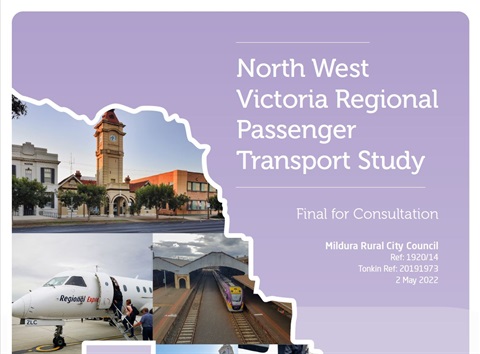
Mildura Rural City Councillors last night endorsed one of the most comprehensive studies ever undertaken into regional passenger transport needs in north west Victoria.
The North West Victoria Regional Passenger Transport Study identifies factors impacting on north west Victorian communities' ability to connect to capital cities, how this affects the respective communities, and possible solutions.
Mildura's Deputy Mayor Jason Modica said the study was connected to one of the four Mildura Future Ready projects identified in 2017 – for Councils to advocate for the return of passenger rail services.
"Returning passenger rail services to our region was a strong theme from our community during consultation for our previous Council Plan, which is why advocating for the service's return was included in the suite of four Mildura Future Ready projects," Cr Modica said.
"A key step in this advocacy work is gaining a thorough understanding of passenger transport needs for the next 20 to 30 years right along the north west corridor, taking in towns between Mildura and Melbourne.
"Only by collecting this information, looking at passenger transport needs generally, not just passenger rail, will we have a clear picture of where there are deficiencies in our transport options, who is impacted, and actions to improve connectivity with the rest of the state."
The study encompassed five regional Councils throughout the north west regional corridor, including Mildura Rural City Council, Buloke, Northern Grampians, Yarriambiack and Central Goldfields Shires.
Following a comprehensive consultation process, which included invitations to community representatives, industry, state and Federal Governments, and all five regional Councils involved in the study area, five key factors were identified as contributors to north west Victoria's transport isolation:
- no passenger rail services
- limited inter and intra-regional bus services
- expensive air services
- high demand for community transport
- long wait times for taxi services.
The study found these factors were contributing to the following challenges for the five local government areas:
- limited access to services, including health
- increased transport costs
- limited education choices and employment
- a poor demographic profile
- reduced regional competitiveness.
The study has since gone on public exhibition before coming back to Council this week for endorsement, including the following eight priority actions:
Mildura passenger rail service
To provide a more efficient and comfortable service for travel between Mildura and other regional towns and the capital city.
Regional passenger transport connections
Improving regional transport services, looking at bus and coach services between Mildura and Melbourne, taking in timing, scheduling, location and quality of transport connections.
Local town bus services
Examination of bus and coach services within respective townships, looking at timing of services, the number of services and adjustment of routes to better serve residents.
On-demand transport
Provision of more and broader 'on-demand' transport services, including community transport options, such as SunAssist.
Rideshare services
Examine introduction of potential rideshare services such as Uber, Ola or private operators.
Station and bus stop upgrades
Examine options to improve amenity, shelter, access and safety at regional bus stations for passengers.
Education about transport options
Community education to highlight alternative transport options, other than just using private vehicles.
Technology and innovation (including autonomous bus trial)
Investigate use of advances in technology to provide more passenger transport options.
Councillors last night endorsed the study, opening the way for the establishment of a dedicated Project Control Group, which will look at how the priority actions can be implemented.
The group will also look at funding opportunities, and how best to advocate for these actions, including advocacy for development of a business case by the Victorian Department of Transport.






